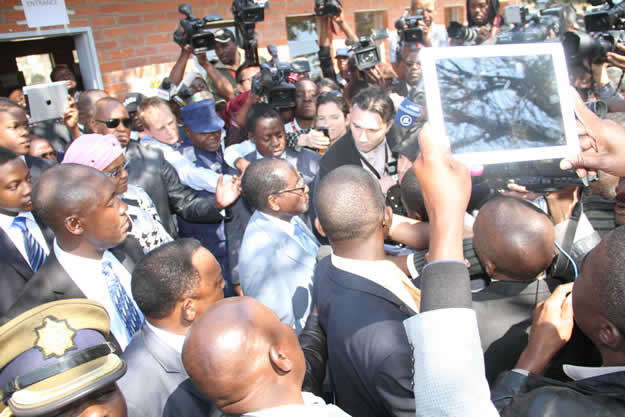Media swarm on Zimbabwe

Sifelani Tsiko Senior Writer
Zimbabwe is this week a clear new leader at the top of media charts with a large media contingent competing to sniff out any headline-making event from the harmonised elections which attracted international attention. A total of 840 journalists have been accredited to cover the election in which President Mugabe faced Morgan Tsvangirai of MDC-T.
Out of this total, 440 are foreign journalists while the remainder are local reporters, a development which has seen the country streaking ahead in terms of global media coverage and hogging the limelight.
Scribes from major news organisations were completely over-represented at a Press conference held on July 30 at the State House by President Mugabe.
A huge media turnout filled the entrance of the State House with a scrum of reporters jostling to cover veteran nationalist and Pan-African newsmaker — President Mugabe.
The swarm of reporters that clustered around the President resembled in many ways the crowds of reporters, photographers and hangers-on that often assemble around a celebrity or other prominent people or just how the royal family features in British journalism.
A huge crowd of foreign and local journalists covered the colourful rallies in the build-up to the election day, helping Zimbabwe to gain the lion’s share of global media attention.
Both the Kenyan and Mali elections have not attracted as much attention as the Zimbabwe polls.
“The mob of journalists in the country for elections is bringing Zimbabwe’s story to the world,” says a Harare-based media analyst.
“I do not think there is any other African country that has attracted so much attention as Zimbabwe. There is something unique about Zimbabwe.”
However, the media analyst says the coverage by the large troop of foreign journalists was hardly positive, towing the usual anti-Mugabe rhetoric in a bid to prop up Morgan Tsvangirai.
“In some instances, they act as vultures seeking for anything wrong or irregular. In some part there is a hidden sort of racist element in their reportage,” he says. “But the tranquillity and serenity prevailing in the country coupled with a better electoral process has sucked some of the oxygen from morbid and negative-hungry foreign media.”
A press conference addressed by President Mugabe on the eve of the election also sucked out more oxygen and sting of the foreign media.
In the interviews, President Mugabe was candid about the country’s electoral process and other critical issues which the foreign media often thrives on.
“We hope that all the faces will not just report this event of the elections as you have seen it objectively,” he said testily.
“You know the damning reports of a Zimbabwe that is disturbed with violence, where there is dictatorship and negative reporting. Completely subjective and not objective but that could avoided.
“We do know of course that your own masters, and some people on top of you who require that even when you have seen the truth and you would want to tell the truth they will say oh, no, don’t say this but say that.
“That happens when you are not the master and someone is your master. I do not know whether some of you here are masters of yourselves or you are going to report to your own masters and these masters are going to accept what you are going to report.”
President Mugabe bantered with the swarm of reporters further.
“Damn these masters who impose on you, who see their own views and don’t want you to express yourselves in an objective way. Damn their policies of being in the negative, where you would want to be objective and positive,” he said.
“I would say, damn your own views if they are your views. Can’t you have positive views? When a thing is wrong, if it is wrong tell it, say it. Don’t be blunt about it, say it is wrong. If Mugabe is a thief or robber, say so. But if Mugabe is right and Blair is wrong please say so.”
President Mugabe has attracted a huge international news media contingent whenever he went abroad to address various conferences.
At various stages of his political life and at major local, regional and international events, a phalanx of satellite dishes, tents and other media broadcast equipment have been specifically set for him as journalists mobbed him to get that quotable quote.
Love him or loathe him, one thing is beyond dispute: President Mugabe, in the words of the late hero Stan Mudenge, is “a man of unmistakable intellect, great oratory skills, alluring wit and charm” and an extraordinary kind of national leader.
He has been described by many as a person of passionate and unswerving moral and political conviction while others have gone a step further to define him as an “unbending revolutionary and unyielding Pan-Africanist and visionary.” Cde Mugabe’s unyielding toughness with white former settler farmers and Western countries, his pitiless enforcement of the land reform programme and rough unfettered black empowerment policies alienated many of his opponents.
All this has generated a voracious, concern-driven appetite for news and an avid thirst for information around his speeches and radical responses to issues he believes in, by the international media.
Cde Mugabe has in the past upbraided journalists for practising what he termed “filthy journalism”, characterised by character assassination and sensationalism.







Comments